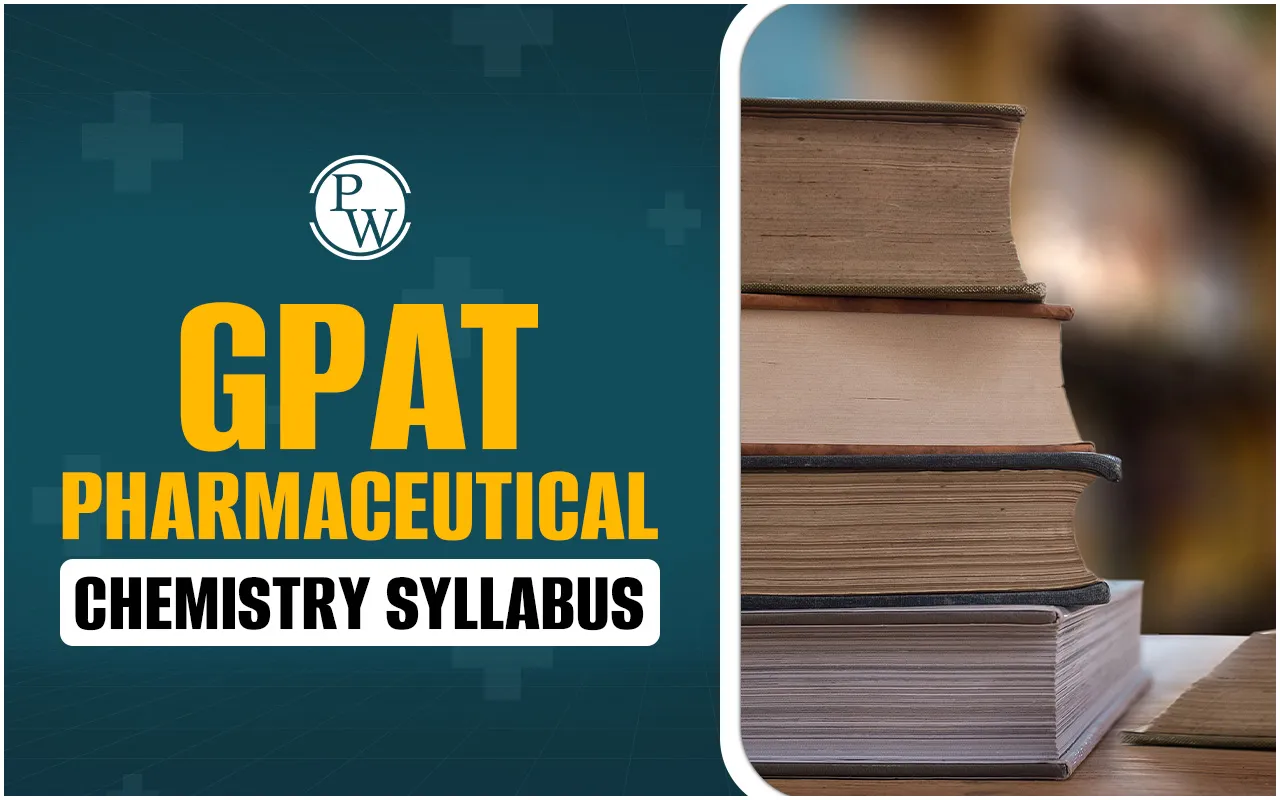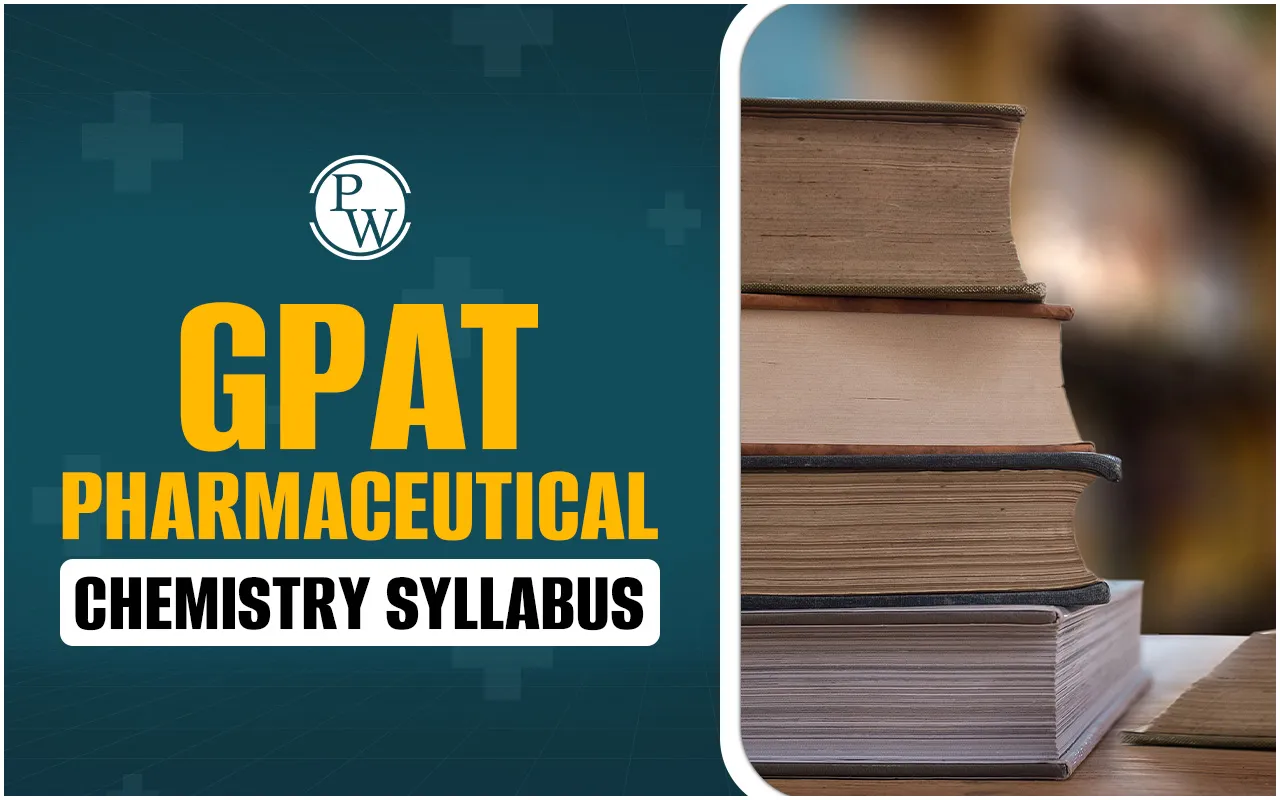

GPAT Pharmaceutical Chemistry Syllabus: GPAT Exam 2025 is going to be held on the 25th of May 2025. The National Board of Examinations in Medical Sciences (NBEMS) conducts GPAT every year to select students for the 2-year M. Pharma program. The exam date is approaching. The GPAT Pharmaceutical Chemistry Syllabus for the GPAT 2025 will be the same as B. Pharma syllabus(2024). Pharmaceutical Chemistry is one of the most important subjects in GPAT.
GPAT Pharmaceutical Chemistry Syllabus 2025 Overview
The GPAT Pharmaceutical Chemistry Syllabus is available on the official website of PCI(Pharmacy Council of India). Candidates can go through the Bachelor of Pharmacy (B. Pharm.) Course Regulations, 2024. As the exam date is approaching, the candidates can help themselves with the provided GPAT Pharmaceutical Chemistry Important Topics and syllabus.
|
GPAT Pharmaceutical Chemistry Syllabus 2025 Overview |
|
|---|---|
|
Name of the Exam |
|
|
Exam Date |
25 May, 2025 |
|
Exam Syllabus |
According to B. Pharm course regulations, 2024. |
|
Topics Included in Pharmaceutical Chemistry Syllabus |
Pharmaceutical Inorganic Chemistry Medicinal Chemistry |
|
Mode of the examination |
Computer-based |
|
Medium of the examination |
English only |
|
Duration of the examination |
3 hours (180 minutes) |
|
Type of Questions |
Objective types |
|
Total number of Questions |
125 |
|
Total marks |
500 |
|
Negative marking |
Yes |
GPAT Pharmaceutical Chemistry Syllabus 2025 Topics
As per the B. Pharm course, 2024, the GPAT Pharmaceutical Chemistry Syllabus will contain topics from Pharmaceutical Inorganic Chemistry and Medicinal Chemistry. The GPAT Pharmaceutical Chemistry Important topics are discussed in the details below:
Pharmaceutical Inorganic Chemistry will contain topics such as Pharmaceutical Impurities, Monographs, Isotopes, Dentifrices and Anticaries Agents, etc:
Pharmaceutical Impurities involves Impurities in pharmaceutical substances, sources, types & effects of impurities. Limit tests for heavy metals like lead, iron, arsenic, and mercury & for chloride & sulphate as per Indian Pharmacopoeia [I. P.].
Monographs include Monograph & its importance, various tests included in monographs as per I. P. A study of the following compounds concerning their methods of preparation, assay, & pharmaceutical uses of sodium citrate, calcium carbonate, copper sulphate, light & heavy kaolin, ammonium chloride & ferrous gluconate.
Isotopes contain topics from stable & radioactive, mode & rate of decay. Types & measurement of radioactivity. Radiopharmaceuticals & their diagnostic & therapeutic applications in pharmacy & medicine such as 125I, 32P, 51Cr, 60Co, 59Fe, 99Tc-M. Radiocontrast media, use of BaSO4 in medicine.
Dentifrices and Anticaries Agents include Dentifrices, role of fluoride in the treatment of dental caries, Desensitizing agents, Calcium carbonate, Sodium fluoride, and Zinceugenol cement.
Medicinal Chemistry includes topics such as therapeutic classes of drugs, Classification, mechanism, action, uses of drugs, etc.
Therapeutic classes of Drugs:
This topic covers nomenclature [including stereochemical aspects], biological activity [including side & toxic effects], mode of action, structure-activity relationship & syntheses of reasonable molecules. It includes:
-
General anesthetics.
-
Local anesthetics.
-
Diagnostic agents.
-
Coagulants, anticoagulants & plasma expanders.
-
Antiseptics, disinfectants, sterilants, & astringents.
-
Purgatives, laxatives & antidiarrhoeal agents.
Various classes of Therapeutic Agents:
A detailed study of the following classes concerning drug nomenclature, classification, physicochemical properties, mode of action [MOA], structure-activity relationships, synthesis of simple & prototype molecules, drug metabolism, therapeutic uses & side effects. Drug resistance, wherever applicable, should be covered in respective classes of drugs.
It includes:
-
Antimalarials
-
Antiamoebic agents
-
Anthelmintic agents
-
Antibacterial sulpha drugs [only]
-
Quinolone antibacterials
-
Antimycobacterial drugs
-
Antifungal agents
-
Antiviral agents including HIV & anti-HIV drugs
-
Thyroid & antithyroid drugs
-
Antiallergic agents
-
Antiulcer agents & Proton Pump Inhibitors
-
Hypoglycemic agent
Different Classes of Therapeutic Drugs
The drug nomenclature, classification, physicochemical properties, mode of action [MOA], structure-activity relationships [SAR], wherever applicable, synthesis of simple & prototype molecules, drug metabolism, therapeutic uses & side effects. Drug resistance, wherever applicable, should be covered in respective classes of drugs:
-
Sedative-hypnotics
-
Antiepileptic agents
-
Neuroleptics
-
Anti-anxiety drugs.
GPAT Pharmaceutical Chemistry Syllabus PDF
The GPAT Pharmaceutical Chemistry Syllabus 2025 is exactly as per the B. Pharm syllabus 2024. Candidates can download the GPAT Pharmaceutical Chemistry Detailed Syllabus in the form of B. Pharm course Regulations, 2024. To download the B. Pharm course Regulations, 2024, candidates can visit the official website of PCI(Pharmacy Council of India). There, they can find the relevant link for B. Pharm course regulations, 2024. Click on the link and download it.
Further, we have provided a direct link to the “Bachelor of Pharmacy (B. Pharm.) Course Regulations”-
GPAT 2025 aspirants can easily find the GPAT Pharmaceutical Chemistry Detailed Syllabus here by simply clicking on the link. Candidates should thoroughly read the B. Pharm syllabus to cover each topic included in the syllabus.
GPAT Pharmaceutical Chemistry Important Topics & Weightage
The knowledge of the GPAT Pharmaceutical Chemistry Important Topics can lead the GPAT 2025 candidates to get a high percentile. The GPAT Pharmaceutical Chemistry syllabus has been the same for the past four years. Therefore, it can be easy to prepare well for this subject.
|
GPAT Pharmaceutical Chemistry Important Topics & Weightage |
|
|---|---|
|
Pharmaceutical Inorganic Chemistry: Impurities, limit tests, monographs, isotopes, dentifrices, anticaries agents. |
~3% |
|
Antimicrobial Drugs: Antimalarials, antifungal agents, antivirals, antibacterial sulpha drugs. |
~3% |
|
Antibiotics: Penicillins, cephalosporins, beta-lactam antibiotics, macrolides, tetracyclines. |
~3% |
|
Therapeutic Classes of Drugs: Anesthetics, antiseptics, anticoagulants, coagulants, laxatives, anti-diarrheal agents. |
~2% |
|
Steroids: Corticosteroids, sex steroids, anabolic steroids, anti-inflammatory steroids. |
~2% |
|
Adrenergic and Cholinergic Drugs: Agonists, antagonists, neurotransmitter functions. |
~2% |
|
Neurological and Neuromuscular Agents: Antiepileptics, neuroleptics, anti-Parkinson’s agents. |
~2% |
|
Anti-Hypertensives and Cardiovascular Drugs: Hypertensive agents, diuretics, anti-anginals. |
~2% |
|
QSAR and Drug Design: Quantitative structure-activity relationship, Hansch analysis, substituent constants. |
~1% |
|
Asymmetric Synthesis: Chirality, enantioselectivity, asymmetric synthesis examples like captopril. |
~1% |
|
Combinatorial Chemistry: Solid-phase synthesis, linkers, mix and split methods. |
~1% |
Topics under pharmaceutical inorganic chemistry, antibiotics, and antimicrobial drugs (around 3% each) have been consistently present in the exam for the past few years. Medicinal Chemistry topics like neurological drugs, steroids, and adrenaline agents are present at about ~2% each. Some advanced topics are also there, including QSAR and Combinatorial Chemistry, are also in the examination.
GPAT Pharmaceutical Chemistry Exam Pattern
The GPAT 2025 is of 500 marks with a total of 125 questions. Candidates can go through the indicative pattern for GPAT issued for the 2025 examination:
|
GPAT Pattern Subject Wise (Indicative) |
||
|---|---|---|
|
Types of Questions |
Number of Questions |
Maximum Marks |
|
Pharmaceutical chemistry & allied subjects |
38 |
152 |
|
Pharmaceutics & Allied Subjects |
38 |
152 |
|
Pharmacognosy & Allied Subjects |
10 |
40 |
|
Pharmacology & Allied Subjects |
28 |
112 |
|
Other Subjects of B. Pharm course |
11 |
44 |
|
Total |
125 |
500 |
As per the official notification for GPAT 2025, the Pharmaceutical Chemistry and allied subjects can carry 152 marks for 38 questions. Therefore, the candidates should focus on this subject to score high.
GPAT Pharmaceutical Chemistry Syllabus FAQs
Where can I find the GPAT 2025 syllabus?
What are the subjects included in GPAT 2025?
What are the maximum marks in GPAT 2025?
What can be the weightage of Pharmaceutical Chemistry in GPAT 2025?
What are the important topics in GPAT Pharmaceutical Chemistry syllabus?




